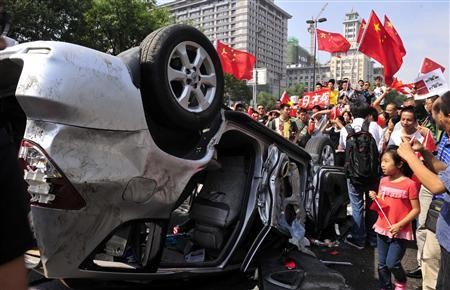More than half of Chinese surveyed said that they have a negative impression of Japan, a fifth higher than that of South Koreans, according to a recent poll by Chinese newspaper Global Times and Seoul-based MK Business News published on Friday.
The survey, which polled 1,000 people each in both China and South Korea, showed that 55.9 of Chinese respondents and 33.1 percent of their South Korean counterparts said that they disliked Japan.
The Japanese government's denial of wartime history and its stance on territorial disputes have led to a negative impression from its neighboring countries.
When asked whether it is necessary for the three nations to restart a summit after three years, 55.2 percent from China and 65.2 percent from South Korea said that the reopening of the dialogue is possible if Japanese Prime Minister Shinzo Abe is willing to apologize for his country's wartime aggression.
Further, 94.2 percent of South Korean respondents and 48.3 percent of Chinese respondents said that they are worried about the revival of militarism from Japan in the coming decade.
"The South Korean people are more alert to Japanese militarism due to Japanese colonial rule in the Korean Peninsula," said Dong Xiangrong, a professor from the National Institute of International Strategy Studies at the Chinese Academy of Social Sciences.
The survey also revealed that, compared to their Chinese peers, the South Korean respondents were more pessimistic about the security situation in Northeast Asia.
High tensions with North Korea have made South Koreans more anxious over the future of the Korean peninsula, Jin Qiangyi, director of the Asia Studies Center at Yanbian, told the Global Times.
Respondents from the two countries also differed on whether the U.S. should interfere if a military conflict breaks out in the East Asia region, according to the survey. Approximately 60 percent of South Koreans surveyed support U.S. interference, while 74.1 percent from China oppose it.
Dong said that South Koreans see the U.S. as an ally capable of maintaining stability in the Asia-Pacific region, while China considers the Western superpower more as a competitor.
The survey also showed that nearly half of the Chinese respondents are open to closer diplomatic ties with Russia followed by ties with the U.S., while roughly 50 percent of South Koreans prefer improved ties with the U.S. followed by China.
Half of the South Koreans polled said that they want their government to establish closer economic ties with China, while the Chinese regard Moscow as the country's top economic partner.
Jin said that South Korea is more inclined to depend on China economically but looks to the U.S. for security.
"On the other hand, abundant resources in Russia attracted many Chinese investors. Politically, China hopes to balance the U.S. influence in the region by working with Russia," said Jin.
The survey also highlighted the preference of 72 percent of Chinese respondents for stronger economic ties with South Korea, and that 44.4 percent of South Koreans support stronger military ties with China.
South Koreans are more aware of the importance of China in helping the country resolve conflicts with North Korea, said Jin.



























